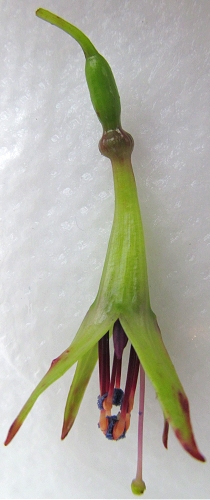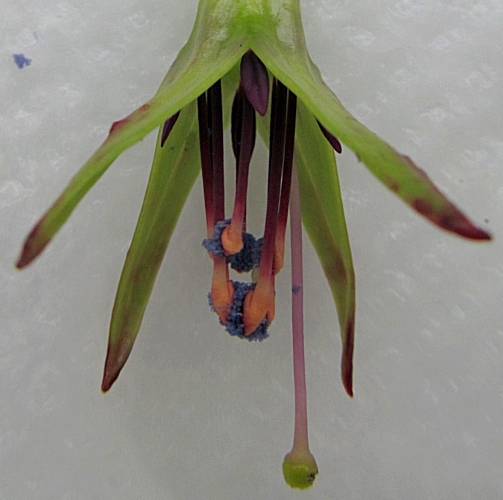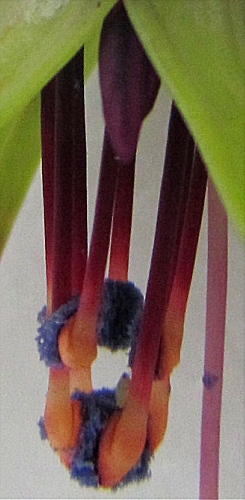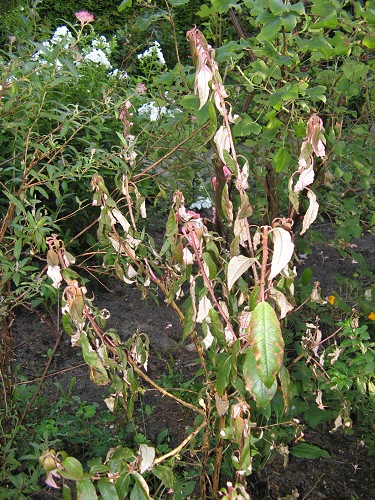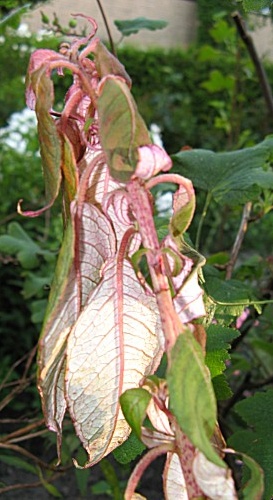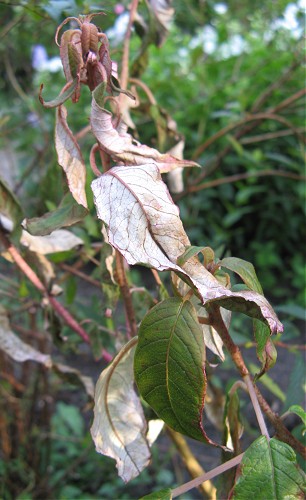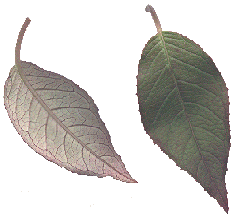


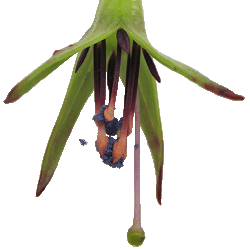

Botanische fuchsia, inheems in Nieuw-Zeeland / Fuchsia species, indigenous in New Zealand
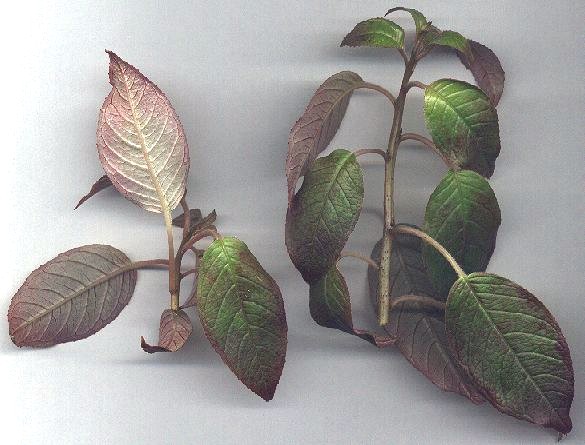
Stekken van Fuchsia excorticata zijn heel moeilijk aan de wortel te krijgen
Fuchsia excorticata cuttings are not easy to root






| Fuchsia excorticata is een forse botanische fuchsia die in Nieuw Zeeland boomhoog aan oevers groeit, zo'n 5 m hoogte schijnt geen zeldzaamheid te zijn. Of deze soort inmiddels ook tot de bedreigde flora behoort, is mij onbekend, maar met de kleine kruipende Fuchsia procumbens is dat wel het geval. Fuchsia excorticata (bij de Maori's bekend als Kotukutuku) heeft als oeverplant ook veel water nodig. Ik heb 'm ooit met veel moeite weten te stekken uit de topjes op bovenstaande scan, maar verdroging ligt constant op de loer; ik heb de vaasjes met stek in plastic zakjes gehouden tot de beworteling, en nadat ze geplant waren ook nog een poosje onder plastic in de potjes. Later lukte het me nooit meer om ze hoe dan ook te stekken! Ik kreeg ze rond 2002 van veredelaar Jan de Boer, lid van onze NKvF-regio die destijds ook nog voorzitter was, maar in 2007 raakte ik ze onverwacht kwijt aan een niet te verklaren verwelkingsziekte - juist toen de struikjes een beetje formaat hadden gekregen zakten ze zomaar inelkaar, terwijl andere fuchsia's eromheen (zelfs de "dochter" 'Lechlade Magician') totaal niets mankeerde! In 2015 kon ik eindelijk aan een nieuwe stek komen van kwekerij Lokhorst waar onze NKvF-regio sinds jaren haar stekken van betrekt, en deze heb ik op een andere plek in de tuin geplant zodat er geen kans is op herbesmetting via de grond. |
Fuchsia excorticata is a robust fuchsia species, growing on river banks as trees about 5 m high. If this species nowadays is in danger of extinction like the creeping little Fuchsia procumbens is unknown to me. Fuchsia excorticata (known as Kotukutuku with the Maoris) needs a lot of water to stay alive. I only once succeeded in getting roots on cuttings (those seen in the above scan), which I put in vases covered with a plastic bag; after planting them in a pot, the plastic still had to keep them moist enough for a couple of weeks. Later I didn't succeed any more whatsoever in getting new cuttings to growth. Around 2002 I got these cuttings from hybridizer Jan de Boer who was chairman of our branch of the Fuchsia Society at that time, but I lost them again by an undefined wilting-disease just at the moment they were becoming a bit bigger and more branched, in 2007. They dropped all their leaves and died, while other fuchsias in their direct vicinity, including "daughter" 'Lechlade Magician', didn't suffer from anything at all. Not until 2015 I could get a new cutting in a pot, from nursery Lokhorst providing our society-branch with plant material for a couple of years already. I put it in the ground far from the spot where formerly the plant had died, to prevent it from getting contaminated again. |
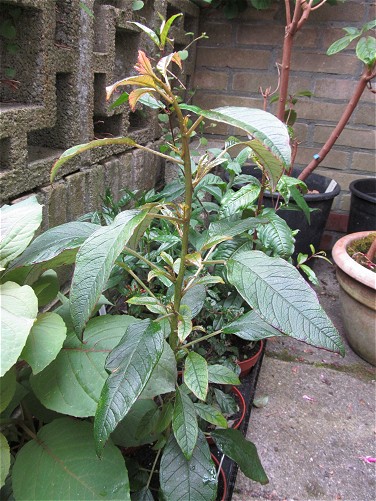
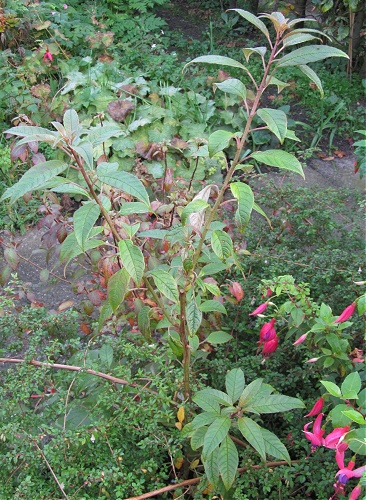
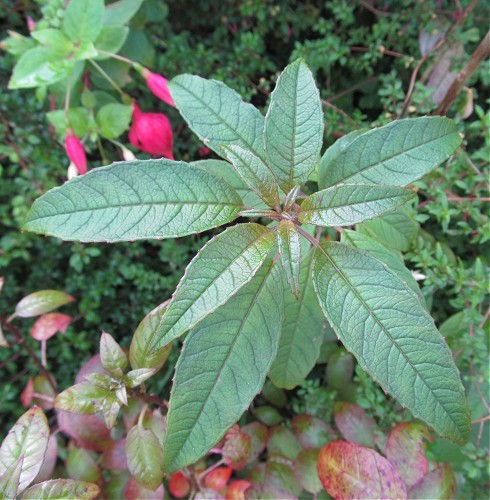
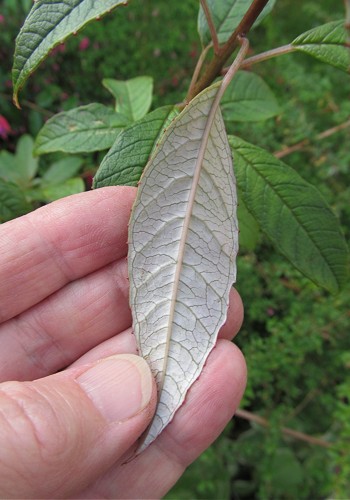
| De bloempjes heb ik tot nog toe nooit aan de plant gezien, maar de heer G. Rosema had wat losse bloempjes als demonstratiemateriaal meegenomen toen hij op de voorjaarsvergadering in 2013 langskwam om een diashow te houden met interessante voorlichting over veredelingswerk. Toen heb ik wat foto's van de bloemen gemaakt. Of ik ze zelf ooit in de tuin krijg, is heel twijfelachtig, want door de winterkou sterft de plant meestal bij de grond af, terwijl hij op 't oude hout moet bloeien... Opmerkelijk is, dat de bloemen in het jonge stadium helemaal groen, of groen met zwarte buis zijn, terwijl ze later naar dofpurper verkleuren, waardoor het lijkt of er verschillend gekleurde bloemen aan dezelfde plant zitten. De minuscule kroonbladen zijn echter meteen al donkerpurper. Evenals die van Fuchsia procumbens hebben de bloemen vrijwel hemelsblauw stuifmeel, een typisch kenmerk van Nieuw-Zeelandse fuchsia's. De Maori's gebruikten het stuifmeel vroeger om het gezicht mee te kleuren bij bepaalde rituelen, misschien ook als ze ten oorlog trokken. |
I never saw any flowers on the plant up till now, but Mr. G. Rosema brought some flowers from fuchsia species when he attended our spring meeting in 2013 to present a slideshow with interesting information about hybridizing. I took some photos of the flowers then. If I'll ever see them myself in the garden, is very doubtful, because the plant in most winters dies back to the ground, while flowers only can appear on the old wood... It's remarkable that the flowers in their young stage are totally green, or green with a black tube, while later-on they get a purplish hue. This makes it look as if there are different coloured flowers on the same plant. The tiny petals, however, are dark-purple from the beginning. Just like those of Fuchsia procumbens the flowers have clear-blue pollen, a typical feature of New Zealand fuchsias. In the olden days the Maoris used this pollen to paint their faces for some rituals or when going to war. |
